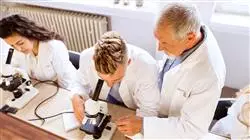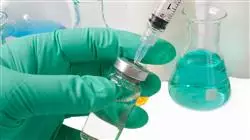University certificate
The world's largest faculty of nursing”
Introduction to the Program
Specialize in the field of Drug Development and work to improve treatments for diseases for which there is no cure"

With the development of this Postgraduate certificate in Drug Research and Development in Nursing, students will delve into the study of preclinical drug.
research, that is, from the time a molecule with therapeutic activity is discovered until it is marketed.
Within the field of research, professionals must also have statistical notions that allow them to carry out the Clinical Trials as accurately as possible. The use of statistics in Clinical Trials allows the researcher to reach reasonable and accurate conclusions from the data collected, and to sound out decisions when certainties are scarce.
In addition, a very important part of the Drug Research and Development process is to know how to communicate the new discoveries, which will allow further research in this field and promote its use in a generalized way, achieving the consequent benefit in patients.
Another point in favor of this program is that it is offered totally online, free of rigid schedules and the need to attend a physical center. In this way, it will be the students themselves who decide from where to study and at what time, eliminating any physical barrier. In this way, the students only need to have a computer or mobile device with an internet connection to access all the material available on the virtual campus.
Prepare with us in Research and Development of Medicines and specialize until you achieve excellence in this field"
This Postgraduate certificate in Drug Research and Development in Nursing contains the most complete and up-to-date scientific program on the market. The most important features include:
- Practical cases presented by experts in Drug Research and Development
- The graphic, schematic, and practical contents with which they are created, provide scientific and practical information on the disciplines that are essential for professional practice
- News on Drug Research and Development
- Practical exercises where the self-assessment process can be carried out to improve learning
- Its special emphasis on innovative methodologies in Drug Research and Development
- Theoretical lessons, questions to the expert, debate forums on controversial topics, and individual reflection work
- Content that is accessible from any fixed or portable device with an internet connection
This Postgraduate certificate is the best investment you can make in the selection of a refresher program for two reasons: in addition to updating your knowledge in Drug Research and Development, you will obtain a degree endorsed by TECH"
The teaching staff includes professionals from the health sector, who bring their experience to this educational program, as well as renowned specialists from leading societies and prestigious universities.
Theultimerdia content, developed with the latest educational technology, will provide the professional with situated and contextual learning, i.e., a simulated environment that will provide immersive education programmed to learn in real situations.
This program is designed around Problem-Based Learning, whereby the professional must try to solve the different professional practice situations that arise throughout the program. For this purpose, the professional will be assisted by an innovative interactive video system developed by renowned and experienced experts in the field of Drug Research and Development.
Do not hesitate to take this educational program with us. You will find the best teaching material with virtual lessons"

This 100% online Postgraduate certificate will allow you to balance your studies with your professional work while increasing your knowledge in this field"
Why study at TECH?
TECH is the world’s largest online university. With an impressive catalog of more than 14,000 university programs available in 11 languages, it is positioned as a leader in employability, with a 99% job placement rate. In addition, it relies on an enormous faculty of more than 6,000 professors of the highest international renown.

Study at the world's largest online university and guarantee your professional success. The future starts at TECH”
The world’s best online university according to FORBES
The prestigious Forbes magazine, specialized in business and finance, has highlighted TECH as “the world's best online university” This is what they have recently stated in an article in their digital edition in which they echo the success story of this institution, “thanks to the academic offer it provides, the selection of its teaching staff, and an innovative learning method aimed at educating the professionals of the future”
A revolutionary study method, a cutting-edge faculty and a practical focus: the key to TECH's success.
The most complete study plans on the university scene
TECH offers the most complete study plans on the university scene, with syllabuses that cover fundamental concepts and, at the same time, the main scientific advances in their specific scientific areas. In addition, these programs are continuously being updated to guarantee students the academic vanguard and the most in-demand professional skills. In this way, the university's qualifications provide its graduates with a significant advantage to propel their careers to success.
TECH offers the most comprehensive and intensive study plans on the current university scene.
A world-class teaching staff
TECH's teaching staff is made up of more than 6,000 professors with the highest international recognition. Professors, researchers and top executives of multinational companies, including Isaiah Covington, performance coach of the Boston Celtics; Magda Romanska, principal investigator at Harvard MetaLAB; Ignacio Wistumba, chairman of the department of translational molecular pathology at MD Anderson Cancer Center; and D.W. Pine, creative director of TIME magazine, among others.
Internationally renowned experts, specialized in different branches of Health, Technology, Communication and Business, form part of the TECH faculty.
A unique learning method
TECH is the first university to use Relearning in all its programs. It is the best online learning methodology, accredited with international teaching quality certifications, provided by prestigious educational agencies. In addition, this disruptive educational model is complemented with the “Case Method”, thereby setting up a unique online teaching strategy. Innovative teaching resources are also implemented, including detailed videos, infographics and interactive summaries.
TECH combines Relearning and the Case Method in all its university programs to guarantee excellent theoretical and practical learning, studying whenever and wherever you want.
The world's largest online university
TECH is the world’s largest online university. We are the largest educational institution, with the best and widest online educational catalog, one hundred percent online and covering the vast majority of areas of knowledge. We offer a large selection of our own degrees and accredited online undergraduate and postgraduate degrees. In total, more than 14,000 university degrees, in eleven different languages, make us the largest educational largest in the world.
TECH has the world's most extensive catalog of academic and official programs, available in more than 11 languages.
Google Premier Partner
The American technology giant has awarded TECH the Google Google Premier Partner badge. This award, which is only available to 3% of the world's companies, highlights the efficient, flexible and tailored experience that this university provides to students. The recognition as a Google Premier Partner not only accredits the maximum rigor, performance and investment in TECH's digital infrastructures, but also places this university as one of the world's leading technology companies.
Google has positioned TECH in the top 3% of the world's most important technology companies by awarding it its Google Premier Partner badge.
The official online university of the NBA
TECH is the official online university of the NBA. Thanks to our agreement with the biggest league in basketball, we offer our students exclusive university programs, as well as a wide variety of educational resources focused on the business of the league and other areas of the sports industry. Each program is made up of a uniquely designed syllabus and features exceptional guest hosts: professionals with a distinguished sports background who will offer their expertise on the most relevant topics.
TECH has been selected by the NBA, the world's top basketball league, as its official online university.
The top-rated university by its students
Students have positioned TECH as the world's top-rated university on the main review websites, with a highest rating of 4.9 out of 5, obtained from more than 1,000 reviews. These results consolidate TECH as the benchmark university institution at an international level, reflecting the excellence and positive impact of its educational model.” reflecting the excellence and positive impact of its educational model.”
TECH is the world’s top-rated university by its students.
Leaders in employability
TECH has managed to become the leading university in employability. 99% of its students obtain jobs in the academic field they have studied, within one year of completing any of the university's programs. A similar number achieve immediate career enhancement. All this thanks to a study methodology that bases its effectiveness on the acquisition of practical skills, which are absolutely necessary for professional development.
99% of TECH graduates find a job within a year of completing their studies.
Postgraduate Certificate in Drug Research and Development for Nursing
New drug research is a field that never stops, as new advances in known diseases are continually emerging and challenging pathologies are discovered that require the development of drugs that maintain the health and quality of life of patients. If you are interested in this area, the Postgraduate Certificate in Nursing Drug Research and Development is an opportunity not to be missed to prepare yourself for the drug development process.
Obtain a high level of preparation in Pharmacokinetics and Pharmacovigilance.
By taking the Postgraduate Certificate in Nursing Drug Research and Development, you have the opportunity to explore the study of preclinical drug research. This includes the process from the discovery of a molecule with therapeutic activity to its commercialization. Undoubtedly, a high level of preparation more than necessary that you will be able to complete in an academic course of 12 weeks and 300 hours in which you will not have to set foot a single day in on-site centers.







